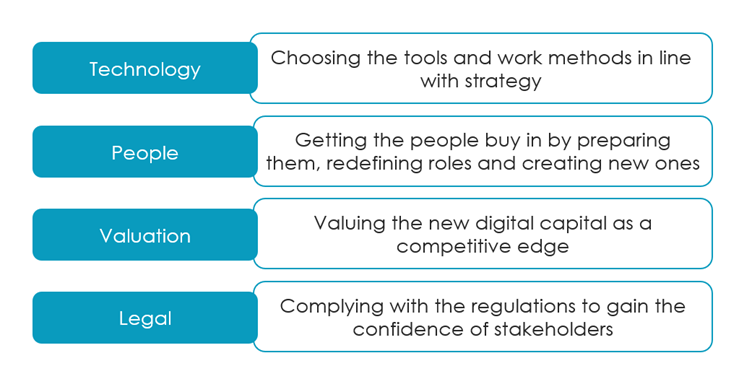What are the keys for a successful Digital Transformation?
Digital transformations are revolutionizing organizations by changing the way they operate and deliver value to customers. A company that goes digital can call everything into question: its jobs, its organization, its vision, its culture and even its business model. In today’s context, remaining competitive for a company means engaging in this change, if not started yet.

You said, “Digital Transformation”?
We often hear about “digital transformation” but what does that mean exactly? This term is broad and sometimes difficult to understand because its meaning is constantly evolving. The digital transformation of 10 years ago has nothing to do with the one that companies are operating today.
Today, digital transformation contains different concepts. A company that wants to transform digitally can tackle the question from different ways. Is it about transforming an old, slow and manual process into fully automated, fast and paperless process? Or is it about using big data to have a better knowledge of the customer and being able to better adapt to the market? Or maybe is it about using digital contact channels to reach the stakeholders faster and more proactively? Here are a few examples that show how the digital transformation can affect many services of a company.
In recent years, most companies already made the digital shift and started completely rethinking their operations. Whether it is to find out new customer behaviors and adapt to them, to resist to new competitors or to take advantage of new technologies in terms of innovation or productivity, companies must address their digital transformation. At Avertim we observed this trend in each of the five business units we work in. The pandemic highlighted the importance of this shift and sharply accelerated the necessity of it.
A key change that supports growth, continuous development and innovation
In the short term, new digital technologies and work methods will mostly speed up internal and external processes, which will boost both efficiency and customer experience. In the medium and long term, digital transformation will open the door to new opportunities for development and business model innovation. A company that performs a successful digital transformation will also acquire sustainable competitive advantages. On the one hand, the company will not have to transform itself digitally a second time because its transformation will help to drive a continuous development and innovation. On the other hand, the transformation will increase its agility and resilience, especially in unexpected situations such as a crisis.
Technology is essential but not the only key
Although technology is significant, it is not the only factor to consider for achieving a successful digital transformation. The success is also about being able to manage the different topics that the transformation will raise like human, economic and legal responsibility aspects. These three aspects are challenges that can and should be anticipated.
After the transformation, employees will have to use new technologies daily and in some cases, they will even be dependent on them. To ensure they embrace this transformation and to support a full integration of the new digital technology, employees will first have to develop/acquire new digital skills at all hierarchical levels. This will require to redefine some existing roles while new roles might be created. Additionally, the identification of buy-in levers among all the company's stakeholders will help to develop a relevant deployment strategy and empower a cross-functional collaboration between internal and external resources. This upgraded ecosystem requires a clear and transparent communication of the (new) company vision to ensure that every single initiative is in line with the global strategy.
A digital transformation often implies, over time, a valuation of the digital capital. Some digital technologies help companies to collect and process data that was previously difficult to handle. If the selected technologies are correctly aligned with the company’s strategy, this data collection and processing can become a new kind of (intangible) capital for the company. This capital which is often difficult to estimate must be internally valued by the company. By successfully valuing this data capital, the company will make the most out of its transformation.
Finally, the digital transformation in a company inevitably raises the personal data management issue. It is precisely the digital transformation trend and the personal data management it involves that has led to the GDPR legislation implementation. This regulation is strict and is not always easy to respect for a company that has not been adequately monitored prior to its transformation. The GDPR legislation has been widely publicized so that a proper compliance can give confidence to stakeholders and allow the company to legally benefit from some internal valuable data (see above).

Figure 1: the 4 pillars of a succcessful digital transformation
Data management is a risk but above all an opportunity
Thanks to the digital transformation, data management has taken on a whole new dimension within companies. Digital tools and new ways of working make it even more possible to leverage data like never before. The risk related to personal data sensitivity and the fact that it must therefore be strictly processed in compliance with the legislation comes with a huge opportunity: companies can now approach the market more efficiently and more targeted, while giving a personalized experience to the end customer.
Conclusion
The concept of Digital transformation is constantly evolving thanks to the new technologies available on the market. Today a digital transformation induces specific challenges that, if properly addressed, will ensure improved efficiency, better customer experience and new opportunities for development and innovation. The added value in terms of data management should not be underestimated but must be rigorously monitored from the very beginning of the transformation especially to ensure a strict compliance with legal regulations. In addition to these benefits, a company that can properly face a digital transformation will also demonstrate to its stakeholders that it can keep up with its customers new expectations.

Written by
Didier V., Lead Consultant, Energy & Utilities
